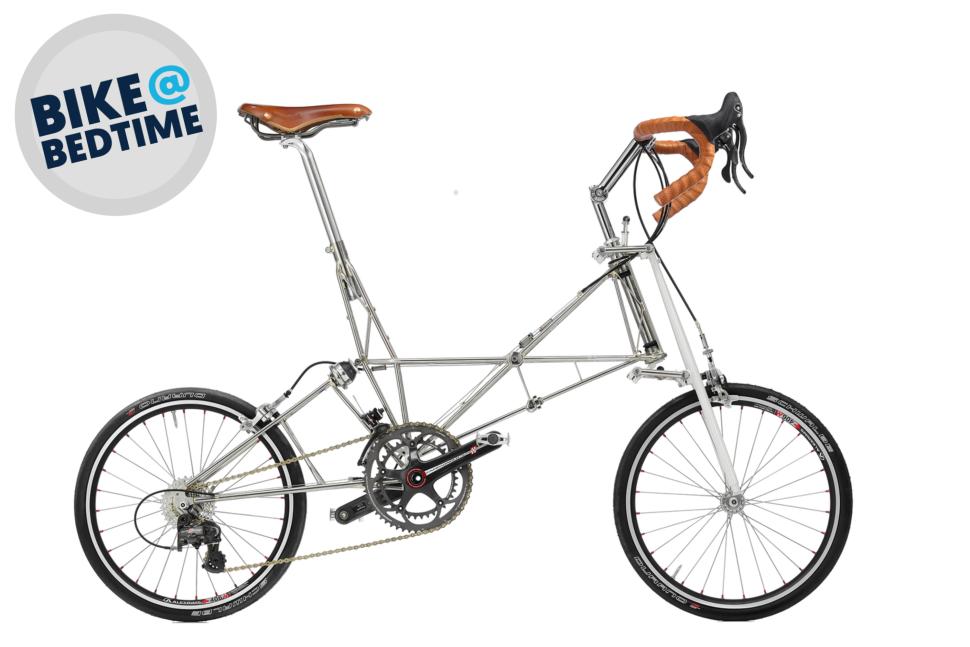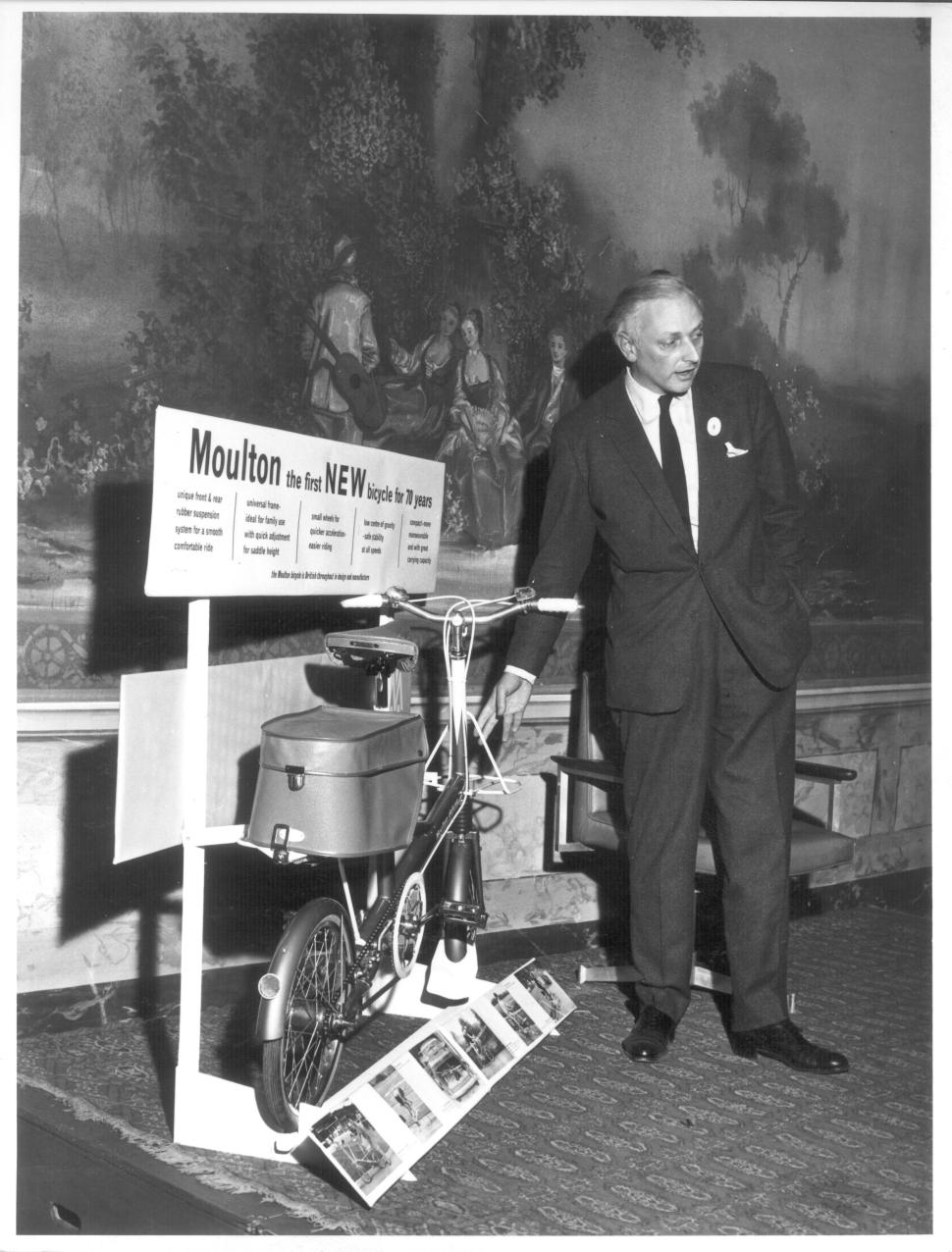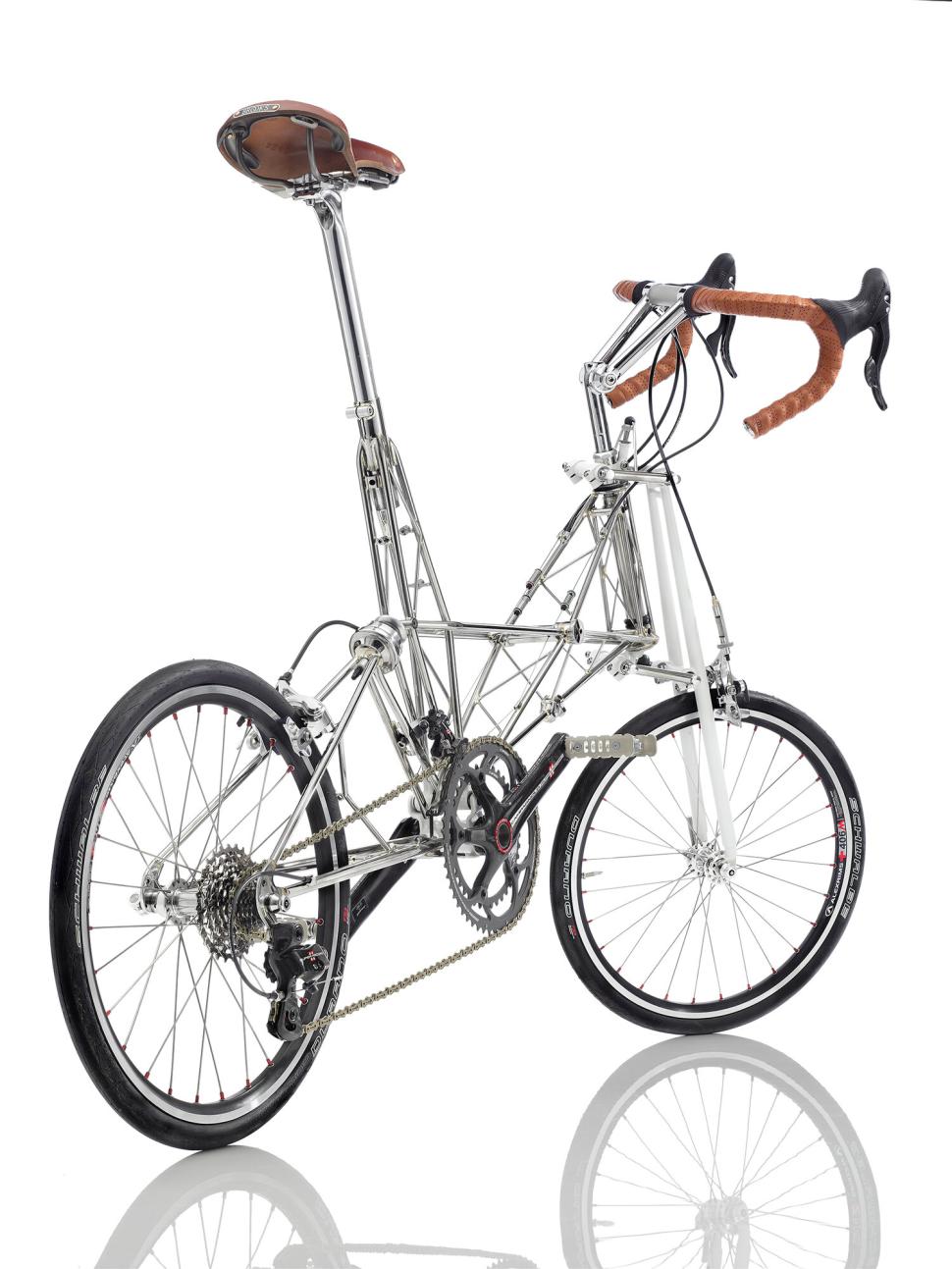- News
- Reviews
- Bikes
- Accessories
- Accessories - misc
- Computer mounts
- Bags
- Bar ends
- Bike bags & cases
- Bottle cages
- Bottles
- Cameras
- Car racks
- Child seats
- Computers
- Glasses
- GPS units
- Helmets
- Lights - front
- Lights - rear
- Lights - sets
- Locks
- Mirrors
- Mudguards
- Racks
- Pumps & CO2 inflators
- Puncture kits
- Reflectives
- Smart watches
- Stands and racks
- Trailers
- Clothing
- Components
- Bar tape & grips
- Bottom brackets
- Brake & gear cables
- Brake & STI levers
- Brake pads & spares
- Brakes
- Cassettes & freewheels
- Chains
- Chainsets & chainrings
- Derailleurs - front
- Derailleurs - rear
- Forks
- Gear levers & shifters
- Groupsets
- Handlebars & extensions
- Headsets
- Hubs
- Inner tubes
- Pedals
- Quick releases & skewers
- Saddles
- Seatposts
- Stems
- Wheels
- Tyres
- Health, fitness and nutrition
- Tools and workshop
- Miscellaneous
- Tubeless valves
- Buyers Guides
- Features
- Forum
- Recommends
- Podcast
feature
 Moulton Double Pylon
Moulton Double PylonGet a load of the Moulton Double Pylon, a 20-inch wheel bike with a £22,000 price tag
With Alex Moulton's original small-wheeled bicycle dubbed "the greatest work of twentieth-century British design" by Norman Foster following Moulton's death in 2012, the Double Pylon takes the inventor's brainchild and turns it up to 11 with some impressively intricate features, stunning finishing kit and a huge price tag, which is higher than anything on our main shortlist of the world's most expensive production road bikes.
Despite being stowable, the Double Pylon isn't technically a folding bike, and despite its 20-inch wheels, it packs in plenty of features. Though if you want to own one, you'll need to wait a good year for it to be made... but that might be a good thing, as it'll give you time to decide if splashing out £21,950 on a bike was a wise idea in the first place!
Moulton bikes have been around for more than six decades, and when they first came out in 1962 they were showcased at the Earl's Court Show in London. Interest was so high that “we had to beat them off with sticks," Moulton’s Marketing Manager at the time, David Duffield, recalled on Moulton's blog.
The Moulton bikes, with their 'mini' size, quickly became a hot commodity, and over 1,500 small-wheelers were built each week in Bradford-on-Avon – the same Wiltshire town the bikes are built in today.
> Dr Alex Moulton dies aged 92
Not only were a lot of 'mini' things trendy in the 1960s (mini skirts, mini cars, and so on) but the Moulton was something almost entirely new in the realm of bikes with the separable frame, small wheels and unisex-one-size design with a rear rack. Thus, perhaps righteously Moulton claims to have "created the small-wheeled bicycle", although folding bikes have existed in some form or another since the early 1900s.
So, what are Moulton bikes like in 2024? Well, they're more modern but still retain some of the very key features of the early bikes. When it comes to the bike showcased here, Moulton says the New Series Double Pylon is the "ultimate Moulton".
Moulton has taken the multi-tube construction to the drawing board and made stainless steel 'pylons' to replace the head and seat tubes to further increase stiffness. The tubes are still made of aerospace stainless steel and silver brazed by hand. The result, according to Moulton, is "sublime ride comfort and breathtaking looks".
> Limited Edition Moulton 60 goes on sale
It's not only the double pylons in this bike that make it quite far removed from the original 1960s design, but the overall bike has seen quite an overhaul. The main tubes which run along the length of the bike are placed outside the pylons, and the spacing around the rear swing arm is different.
The 'separability', as Moulton calls it, remains much the same as it was on the original Moulton bikes, with the Two Pylon frame section separating into two halves via the removal of a kingpin. The front and rear 'fork' should also be quite easy to remove for transport.
The fork (made of Reynolds' highest grade 953 stainless steel) is new, with a Moulton Flexitor (featuring an adjustable bump-stop and soft lock-out) at the front and a Moulton Hydrolastic with Moulton Flexitor pivot at the back.
Then, we have the overall build kit. No expense is spared of course, and the New Series Double Pylon is built up with a Campagnolo Super Record 12-speed groupset. You get a 10-32T cassette with either 53/39T or 58/44T chainrings.
> A history of folding bikes with Mark Bickerton
The handlebar is Deda Speciale Classic, and you can choose either a 44cm or 42cm width. The bars are wrapped in Brooks Leather bar tape, and Brooks also supplies the Leather Swift Ti saddle. The wheels are stealthy black Moulton MT20 shod in Schwalbe Durano tyres.
What about that price then? The New Series Double Pylon is priced at a whopping £21,950 (about the same as a Mini Cooper, or about ten times more than the 'cheapest' Moulton on its website right now) and as mentioned earlier, the lead time is currently around 12 months. That is perhaps partially due to the complex nature of the double-pylon frame, which has a trade-off of adding complexity and man-hours to the manufacturing process, but then again none of the new Moultons are currently shipping with less than a three-month lead time.
Is this the ultimate small-wheeled bike? Let us know in the comments if you'd like to own one, and be sure to also check out our other Bike at Bedtime features.
Suvi joined F-At in 2022, first writing for off-road.cc and then road.cc and ebiketips too until August 2024. She contributed to all of the sites covering tech news, features, reviews and women's cycling content. A lover of long-distance cycling, Suvi is easily convinced to join any rides and events that cover over 100km, and ideally, plenty of cake and coffee stops.
Latest Comments
- Rendel Harris 20 min 30 sec ago
Tricky one to prove driver liability I'd say because if you look closely at the video the direct cause of the crash is that the #3 rider actually...
- WolfieSmith 47 min 37 sec ago
Damn. Oh well... My plan is... I cancel Zwift for the summer as usual. I take that saved cash and pay the TNT shysters for the Giro and TDF for 3...
- bensynnock 1 hour 43 min ago
Some models have a front section that you can remove and rotate to permit the dipped beam while mounted upside down.
- David9694 1 hour 54 min ago
Wiltshire drivers ignore advice amidst flood chaos https://www.wiltshiretimes.co.uk/news/24892767.wiltshires-drivers-ignore...
- David9694 2 hours 1 min ago
OK, OK, you get a £10 voucher to spend at the Diddly Squat farm shop.
- Muddy Ford 2 hours 35 min ago
"Failure to comply with any direction given by a constable or by a notice exhibited by order of the Secretary of State regarding the use of a pedal...
- 60kg lean keen climbing machine 2 hours 44 min ago
I think that the Wrexham Council should do this but concentrate on roads that many who cycle and walk would use, I do not know if they have access...
- brooksby 3 hours 27 min ago
Mine has a hinge along the bottom edge for the same purpose. But so few dog walkers seem to either have that or can't work out how to use it...
- ktache 3 hours 32 min ago
Don't forget the rollercoaster of driveway height/not driveway height. And worrying about concealed entrances, I mean there's signs...



Add new comment
24 comments
One of the guys I gravel with has a Moulton.
He goes everywhere we do with it - on Marathon Plus tyres as he can't get off road tyres small enough to fit his rims.
Wet grass is his normal downfall - no grip because of the MPs - but what a machine ... him and the bike
I've got the 'cheaper' Moulton Speed, which is half the price and much lighter than the twin pylon. It really zips about and climbs amazingly. I also have big wheeled bikes and enjoy riding either. You do end up pedalling more to keep those small wheels turning (even with the 58/44 chain ring) and I miss the rotational momentum of big wheels into a head wind. But they are amazing bikes. I'm glad there's still room in the industry for a more idiosyncratic design. The reason you don't see them racing is that the UCI banned them in the '60s because they kept winning things...
Yeah, they've got history there.
Not quite the same thing though, recumbents and small wheeled bikes (the supposed serial victories of which I've never heard about).
Curious - the bike in the press images appears to have Campag drivetrain with SRAM calipers.
I don't see the appeal.
Sure, it's an interesting piece of engineering but that's about the highest praise you will get from me. Obviously I haven't ridden one, but it seems to offer no practical or performance advantages over any number of other bikes available. It's neither as portable as a proper folding bike like a Brompton, nor can I imagine it offers as nice a ride as a modern full sized bike. And whilst its looks might be unusual, I for one wouldn't say it's a thing of beauty.
Let's face it - no-one is going to buy one of these to actually ride. If any are sold, they will end up as overpriced ornaments.
As an owner of said bike thought my comments might interest. Got it in 2007 and has been upgraded by factory to a similar to current specs, it's done a huge mileage yet still looks new. (no paint to chip). It can easily br converted to long distant touring with purpose designed racks and luggage used on cross Europe and camping trips as well as day/credit card touring with day rack and bag. Pack it in a suitcase and it travels as luggage. It's surprisingly capable off road although gets put out by rutted roads, on good roads it's super smooth and untiring on long rides, it's light for a steel bike, super light for a touring bike. I love it!
Hmmm.
I can't claim to have ridden one of these, so can't comment on the ride quality / energy required.
I am interested in the pylon construction - very Chain Home / Wellington Bomber.
I'm also interested in the Hydrolastic suspension - is this full Hydrolastic with the front / rear interconnection?
Article says the rear is hydrolastic...and the front is "flexitor". Whatever the fudge that is. I don't see an exposed hose routed front to back, and don't see a way of routing one internally either.
I want one.... happy to part exchange the wife, children and grandchildren plus £20K cash.
Shouldn't it have mudguards - to help protect the components and frame from road dirt / salt / grit.
Moulton has always been one of those 'think different' brands but unlike Apple, never quite got what it deserved for its engineerign and design prowess. A remarkable bike which shouldnt be measured by price - compared to so many other expensive high end bikes which essentialy do the same as cheaper bikes and the added value is not visible.
Some minor corrections... The original Moulton had, I think, 16 or 17" rather than 20" wheels, and "despite its small wheels, it packs in plenty of features" misses the point that the small wheels *are* a feature in Moulton's desigs: combined with high pressure tyres and suspension the rolling resistance issues of smaller wheels are (at least for decent roads) largely done away with and that allows easier frame design that dots a wider range of rider size and nippier handling (ever notice how Mini cars don't have wheels like tractors?).
It's not "whyy does that bike have small wheels?", but why do so many others have clumsy big ones?
Wheel sizes - horses for courses. And there have always been a range (consider the massive expansion of the 26" market some decades ago).
However I do wonder whether the smaller sizes may get another bite of the cherry in the UK given the salience of folders and an e-bike sector featuring e.g. normal-bike-sized cargo-bikes for easier storage (e.g. Tern's GSD and HSD among several others)? Given "everyday use", wider acceptance of larger tyres, modern suspension, poor quality UK tarmac surfaces ... having smaller (and stronger) wheels may be much more appealing?
was that the expansion to 29" ?
Big and heavy wheels have the benefit that provide more gyroscopic effect so it is harder to fall of the road, and less rolling resistance, otherwise we would see TdF in mini-velo bicycles. I can understand the practical benefits of small wheels, but I feel safer and lazier on big wheels.
This shiny Moulton seems nice for a wall, but cleaning it must be PITA
Would pay (not very much) to see this
I wax my chains so all it requires and all it gets from me is a hose down now and then with no polishing. Small wheels are light and strong and change direction quickly. Rolling resistance is greater on open surface tarmac and a problem on rocks and because of higher torque transference can loose traction on slippy surfaces but equally you will be quick away from the lights
It's no coincidence that the most common wheel sizes today (and for the last 100 years or so), 700C, 650B and 26" shod with the appropriate tyres have more or less the same outside diametre.
Smaller wheels have their uses but also their drawbacks.
Actually, 700C and 29ers are the same bead size. We've had mnt bikers convert to 28 - 30 mm tires to ride distance on roads. It is quite the look!
Yes, 29" is just a marketing term.
P.S.: Note that in Germany 700C is sometimes called 28"...
Corrected re the original wheel size. I don't think 'despite' was meant as a criticism of small wheelers, just literally referring to the fact that all the tech and engineering is packed into a smaller space, which might defy conventional wisdom.
Yep, original Moultons had 16-inch wheels, and the 'Mini' versions had 14-inchers.
The AM series of the 1980s used a 17-inch size that was unique to Moulton; arguably not the smartest idea Dr Alex ever had.
One-time MBUK deputy editor and all-round vehicle guru Paul Smith, who has sadly vanished from the bike scene, once told me the Double Pylon was the fastest bike he'd ever ridden downhill. The suspension just glues it to the road, apparently.
There were also 17-inch tubulars used for racing Moultons.
[dupe deleted]